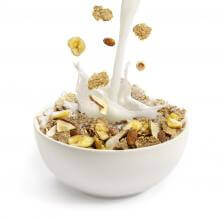Can Whole Milk Keep You Thin?
A slew of recent research suggests that the old advice to choose low-fat dairy may be wrong. High-fat dairy products appear to help keep you leaner. Nutrition Diva takes a closer look at this apparent paradox.
Nutrition Diva listener JoAnn writes: “What is your take on the full-fat paradox–that whole milk may keep us lean?”
JoAnn is referring to a couple of new studies that made headlines recently, suggesting that people who eat more full-fat dairy products actually have a lower risk of obesity–and all the things that go with obesity, such as increased risk of heart disease and diabetes. This, of course, is completely contrary to the conventional wisdom.
Squarespace, the all-in-one platform that makes it fast and easy to create your own professional website, e-commerce site, or online portfolio. For a free trial and 10% off, go to squarespace.com/diva and use offer code Diva.
For decades now, we’ve been advised to choose low-fat dairy products over full-fat, for a couple of reasons. First, low-fat dairy products are lower in calories and, therefore, should help us avoid weight gain. Secondly, the fat in dairy products is largely saturated fat and limiting saturated fat is thought to reduce the risk of heart disease.
I’ve talked quite a bit in recent months about the increasingly questionable link between saturated fat intake and heart disease risk. People who eat more saturated fat do not appear to have any higher risk of heart disease than those who avoid it.
Surprisingly, the more dairy fat you eat, the lower your risk of developing obesity.
And now this: Eating full-fat dairy products doesn’t seem to pack on the pounds. In fact, it seems to ward off excess weight gain over time. In one analysis of 1500 Scandinavian men who were studied over the course of 12 years, those who ate only low-fat dairy products were twice as likely to become obese as those who reported eating butter, cream, and full-fat milk on a daily or near daily basis–even after adjusting for other variables such as vegetable intake, physical activity, alcohol consumption, and age. (And, just in case you’re wondering, this research was not funded by the dairy industry!)
Stepping back even further, a recent review looked at 16 different studies that assessed both dairy fat intake and weight gain and/or heart disease risk. In 11 out of the 16, dairy fat intake was inversely associated with obesity and heart disease risk. “Inversely associated” means that the more dairy fat you eat, the lower your risk. And the same appears to be true of kids: children who are given skim and low-fat milk to drink are actually more likely to develop childhood obesity.
See also: Is Milk Bad for You?
All of these are correlations, of course, and not controlled studies. But as these correlations pile up, it may be time to reconsider the conventional wisdom that low-fat dairy products are always preferable.
How Could Butterfat Keep You Lean?
For scientists, the real fun of these sorts of observations is coming up with hypotheses to explain them, and then figuring out how to design a study to test those hypotheses. And there are several things that could explain how eating more butterfat could help keep you leaner.
 Hypothesis #1: More Fat = More Filling
Hypothesis #1: More Fat = More Filling
One possibility is that high-fat dairy products increase your satiety after a meal. Meals that are higher in fat are more slowly digested and absorbed, which means that you go longer before you start to get hungry again. If you pour whole milk over your cereal instead of skim milk, for example, you might add 50 to 100 calories to your breakfast. However, the increased satiety might mean that you’re not as likely to need a snack mid-way through your morning. If you add 100 calories to breakfast but then avoid a 250 calorie donut at 10am, you’re 150 calories ahead of the game.
See also: 3 Tips on How to Eat Less Without Feeling Hungry
Not only does it keep you full longer, but fat also tends to be more satisfying in the moment–which, believe it or not, could help you eat less. For example, I can think of few things in life that make me sadder than reduced-fat cheese. I’m much happier eating two or three crackers spread with a triple-cream Brie than 10 crackers topped with reduced-fat cheddar. I think of this as the “savor and stop” effect.
Hypothesis #2: Higher Fat Means Lower Blood Sugar
A somewhat related possibility is that the higher fat content in full-fat dairy products helps keep your blood sugar steadier. Adding fat to a meal slows down the speed at which your blood sugar rises and falls as you digest your food. This slower rise and fall in blood sugar may help keep your appetite and fat-storage hormones on a more even keel, reducing the risk of diabetes as well as weight gain.
See also: What Is High Glucose?
Hypothesis #3: There’s a Magical Ingredient
Perhaps the most fun thing to think about is that there is some sort of magical ingredient in dairy products that promotes weight loss. (I mean, do we ever get tired of magical ingredients that promote weight loss?)
There has been quite a bit of research on calcium’s ability to enhance fat loss. However, this is probably not a factor here because high-fat and low-fat dairy have about the same amount of calcium. If anything, low-fat dairy products have a bit more calcium.
Milk from grass-fed cows is higher in these potentially beneficial compounds than milk produced on industrial feed lots.
A more likely candidate would be something in dairy fat itself. There are number of fatty acids that could plausibly play a role. Conjugated linoleic acid. for example, has become a popular weight loss supplement, mostly on the strength of some early animal research. Research on CLA to promote fat loss in humans has been disappointing but this doesn’t seem to have made a dent in sales. In any case, the amounts of CLA in dairy products are relatively small, making it even less likely that CLA is a major player in this story.
Butyric acid and palmitoleiic acid are other dairy-based fatty acids with potential to regulate fat metabolism and weight. Or, we could be seeing the combined effect of several of these compounds.
See also: Is Grass-Fed Beef Better For You?
It’s too soon to say whether these fatty acids–alone or in combination–are responsible for any of the observed effects of high-fat dairy consumption. But, for what it’s worth, milk from grass-fed cows is generally higher in these potentially beneficial compounds than milk produced on industrial feed lots.
What to Do With This Research?
All this is very interesting for nutrition researchers, of course. But where does this incomplete and preliminary information leave you? Should you switch from low-fat to high-fat dairy products? Potentially, yes–but with caution. Simply switching from skim milk to whole milk will add calories to your diet, which, in the absense of other adjustments, can lead to unwanted weight gain.
No one food or nutrient is a magic bullet for weight loss. It’s how you put it all together that counts.
Here are a few tips:
-
Work the satiety angle. If you currently eat low-fat yogurt, cottage cheese, or cheese, try replacing these with the full-fat versions and see if it helps you cut down on between-meal snacking.
-
Remember to savor and stop. Treat yourself to real cream in your coffee, if you like, but have one cup instead of three. The idea is to upgrade quality but decrease quantity.
-
Consider the source. Watch out for full-fat dairy foods that are also high in sugar or refined flour–such as creme brulee or cheese-stuffed pizza crust. While butterfat may not be the villain it’s sometimes made out to be, I think that the combination of fat and sugar and/or white flour can do quite a bit of damage.
-
One size does not fit all. Although eating more full-fat dairy products doesn’t seem to increase risk of obesity or heart disease in the general population, your doctor or nutrition professional can help you decide what is right for your particular situation–especially if you are already overweight or have risk factors for heart disease.
Share your questions and comments below or on the Nutrition Diva Facebook page. I always love to hear what you’re thinking (and eating)!



 Hypothesis #1: More Fat = More Filling
Hypothesis #1: More Fat = More Filling Work the satiety angle. If you currently eat low-fat yogurt, cottage cheese, or cheese, try replacing these with the full-fat versions and see if it helps you cut down on between-meal snacking.
Work the satiety angle. If you currently eat low-fat yogurt, cottage cheese, or cheese, try replacing these with the full-fat versions and see if it helps you cut down on between-meal snacking. 



